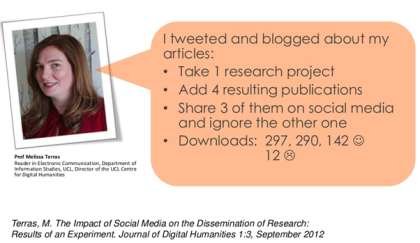In this blog post, Kim Eggleton, our Journals Executive, explains why she believes social media is the researcher’s new best friend

Kim Eggleton, Journals Executive
Whenever I talk to researchers about using social media, the most common “objection” I hear is that it’s self-promotion, and nothing more than vanity.
The second most common protest is that good research should stand on its own merits, and if it’s good enough, people will find it. I can understand where both these opinions come from, but I think the world has moved on considerably and neither of these concerns are valid any longer.

…in 2012, over 1.8 million articles were published in 28,000 journals.
With the inevitable overload of information that came with Internet for the masses, it has become harder and harder to make good work stand out. It is estimated that in 2012, over 1.8 million articles were published in 28,000 journals. In 2010 in the US alone, it is estimated that over 320,000 books were published.
How can you help people to find your work? Well, metadata is one way – more about that another time. But social media is another. You’d be surprised how many academics are on there (there are various figures banded around but this is a good overview). What’s more, they’re using it in a professional capacity.
Why use Social Media?
According to a recent survey by Kudos, 84% of researchers agree more could be done to improve levels of visibility, usage and impact. Most also agreed it was their responsibility, above that of their institution, funder or Publisher.
From a Publisher’s point of view, I can also attest to the fact that considerably more value is placed on the opinion of a researcher than a publisher. You bring credibility. You also bring the network and the knowledge – you’ll probably already have a lot of the contacts you want to reach.
The optimum time it should take to read a blog post is 3 minutes.
Don’t forget, it’s not just academics that you’re reaching through social media. I’m a pretty firm believer in the ethos that research should have an impact on wider society, and social media is one of the easiest ways to get your work out to Joe Public. Twitter for example forces you to condense your messages to 140 characters. The optimum time it should take to read a blog post is 3 minutes. By communicating your research in simple, easy-to-understand language, you are making it psychologically accessible to an little-informed public.
It’s not an easy skill, but there are tools out there that can help you. Policy Press partners withKudos, a free tool for researchers which helps them explain, enrich and share their publications for greater research impact. Institutional press offices and research communications managers are also a great source of information and advice.
The answers speak for themselves.

The pilot that Kudos ran before launch found articles that used the tools got 19% more downloads a day. A study recently published in PLOS One found the mean rate of downloads increased three-fold following social media promotion.
Pressures are increasing on researchers to engage with broader audiences and demonstrate impact. I think social media is the first step towards achieving this – give it a try.
And to prove we practice what we preach, you can find all of the Policy Press journals on Twitter, two of them on Facebook (Policy & Politics and Critical and Radical Social Work), one has its own blog…

